In British culture, 'Nan' is an affectionate term for grandmother, deeply rooted in familial nomenclature and linguistic traditions. Originating from diminutives of common female names like Anne, the usage of 'Nan' reflects an intimate modification within family linguistics. This term embodies a unique blend of respect and affection, indicative of the broader societal values surrounding family and relations in the UK. Variations and nuanced interpretations across regions highlight the linguistic evolution of 'Nan,' showcasing its cultural and social significance. Understanding and appreciating the diverse connotations of 'Nan' can enhance your grasp of British familial dynamics and cultural expressions, revealing layers of contextual richness.
Key Takeaways
- 'Nan' is a term of endearment for grandmother in British English, reflecting familial affection.
- It originates from diminutive forms of female names like Anne, used affectionately in families.
- The term embodies cultural values, portraying grandmothers as nurturing and sometimes cheeky figures.
- Variations of 'nan' exist across the UK, showcasing regional dialects and linguistic nuances.
- In media and literature, 'nan' depicts British grandmothers, exploring diverse familial dynamics and societal expectations.
Origins of 'Nan'

Delving into the origins of 'Nan', it's essential to understand that this term emerges from a rich tapestry of linguistic evolution, deeply rooted in British culture and familial nomenclature. The etymology of 'Nan' can be traced back to diminutive forms of common female names like Anne or Ann, which were affectionately shortened in familial contexts. This practice of abbreviation reflects a broader linguistic phenomenon in which personal names undergo modification to express intimacy, endearment, or familiarity.
Analyzing the Nan pronunciation, you'll find that it adheres to the phonetic simplicity characteristic of many diminutive forms. The vowel sound in 'Nan' is typically short, mirroring the phonetic patterns found in the British English pronunciation of names like Anne. This phonetic simplicity, coupled with the term's brevity, facilitates its adoption and usage within casual, intimate settings of family life.
The linguistic journey of 'Nan' from a mere nickname to a term embedded within the lexicon of British slang underscores its flexibility and enduring relevance. This evolution is indicative of the fluid nature of language, where terms can transcend their original contexts to acquire broader societal meanings. In the case of 'Nan', what began as a personal form of address has burgeoned into a cultural signifier, encapsulating notions of warmth, familiarity, and affection inherent in familial relationships.
Thus, the etymology and pronunciation of 'Nan' aren't merely academic curiosities but are integral to understanding how language reflects and shapes human relationships. The story of 'Nan' is a demonstration to the dynamic interplay between language, culture, and social interaction.
'Nan' in Everyday Language
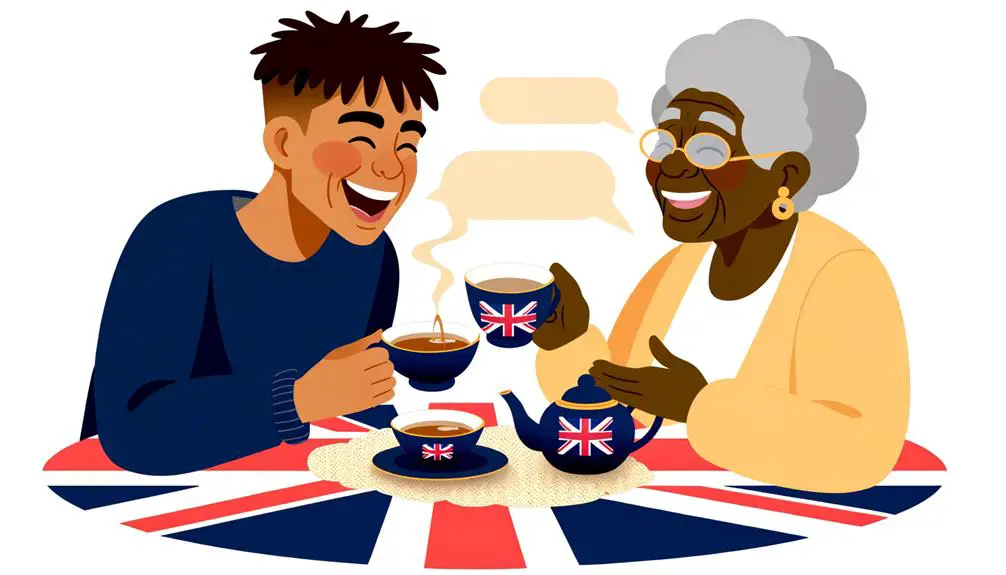
You must examine how 'Nan' has woven itself into everyday language, beginning with its origins.
This entails exploring its usage in conversations, where nuances and variations highlight its adaptability and enduring relevance.
Additionally, evaluating its cultural impact today reveals the term's evolution and its reflection of societal changes.
Origin of 'Nan'
Exploring the origin of 'Nan' reveals its deep roots in everyday language, tracing back to its use as an affectionate term for one's grandmother in British English. The nan etymology is fascinating, weaving through the fabric of language evolution and familial terms.
Comparative linguistics offers insights into how 'Nan', and similar terms, have developed and diverged across languages and cultures. This analysis highlights the affectionate diminutives common in family language, suggesting a universal tendency to create endearing terms for loved ones.
'Nan' embodies this trend, evolving from more formal nomenclature to a term of warmth and intimacy. Its journey from a specific familial title to a broader slang term reflects the dynamic nature of language, adapting and adopting new meanings over time.
Usage in Conversations
In everyday language, the term 'Nan' permeates conversations, serving as a proof of its entrenched role in expressing familial affection and cultural identity. When analyzing the usage of 'Nan' in dialogues, one discerns a pattern that blends reverence with informality. The deployment of 'nan phrases' often follows a cultural script, illustrating scenarios where grandchildren recount tales or seek advice, encapsulating a distinct British familial dynamic.
Additionally, 'nan etiquette' governs these exchanges, dictating the subtleties of respect and familiarity that underscore the relationship. This etiquette guarantees that the term's usage reinforces bonds rather than diminishes them, embedding 'Nan' deeply in the fabric of everyday communication. Such linguistic practices highlight the nuanced ways in which language mirrors societal values and relationships.
Cultural Impact Today
The term 'Nan,' deeply ingrained in British vernacular, profoundly influences contemporary cultural narratives and identity formation within the United Kingdom. It's not just a reference to one's grandmother anymore; it's a symbol that shapes intergenerational relationships and societal norms.
Nan fashion trends, for example, demonstrate how elements traditionally associated with older generations have permeated mainstream youth culture, signifying a blend of respect, nostalgia, and irony in fashion choices. This fusion underscores a broader cultural shift towards valuing and integrating the wisdom and aesthetics of older generations into the daily lives of the younger populace.
Consequently, the term 'Nan' transcends its literal meaning, embodying a dynamic interplay between tradition and modernity, shaping identities across age divides in the process.
Cultural Significance
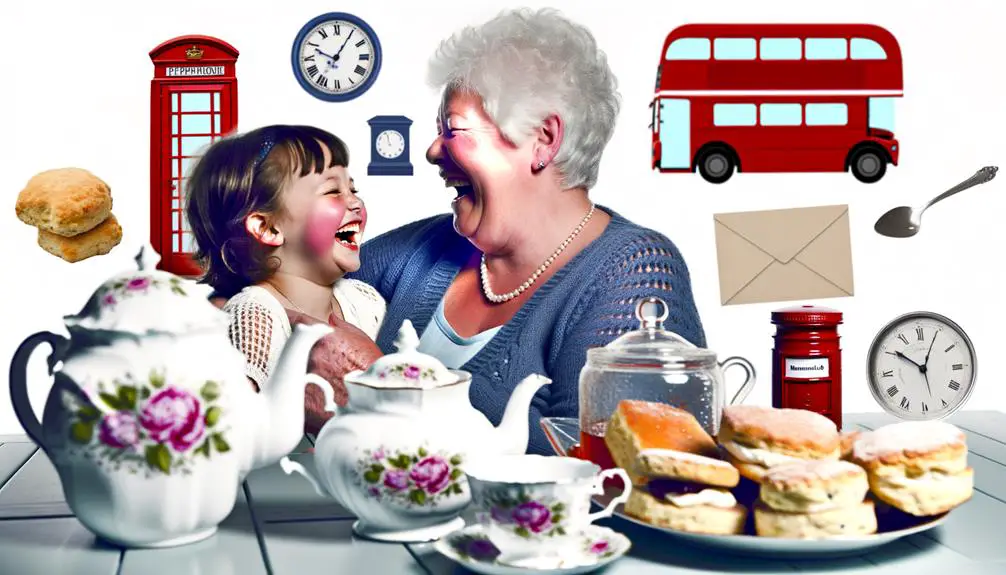
Many British families hold the term 'nan' in high regard, attributing to it not just a familial connection but a deep-seated cultural importance that reflects broader societal values and relationships. This reverence goes beyond the mere denotation of the word, weaving into the fabric of British culture an archetype that encompasses warmth, wisdom, and the matriarchal backbone of family life. Nan stereotypes, often portrayed in media and conversational anecdotes, contribute greatly to this cultural tapestry. These stereotypes typically paint nans as nurturing, slightly cheeky, and invariably clad in what's affectionately come to be known as 'nan fashion'—a unique blend of comfort and timeless style that defies the fast-paced changes of the fashion world.
The cultural importance of 'nan' extends into a broader reflection of the UK's valuing of intergenerational relationships and the pivotal role that grandparents play in family dynamics. Unlike the more universal term 'grandmother', 'nan' carries with it a uniquely British connotation, one that embodies not just a biological relationship but a cherished, almost sacred emotional bond. This term encapsulates a blend of respect, affection, and the kind of familial reverence that has been passed down through generations, becoming ingrained in the British psyche.
Analyzing the cultural importance of 'nan' reveals much about British societal values, including the emphasis on family, the respect for elders, and the affectionate, sometimes humor-laden, way in which these relationships are navigated. It's a term that, in its simplicity, holds a mirror to the complex, interwoven fabric of British society and its enduring values.
Variations Across the UK
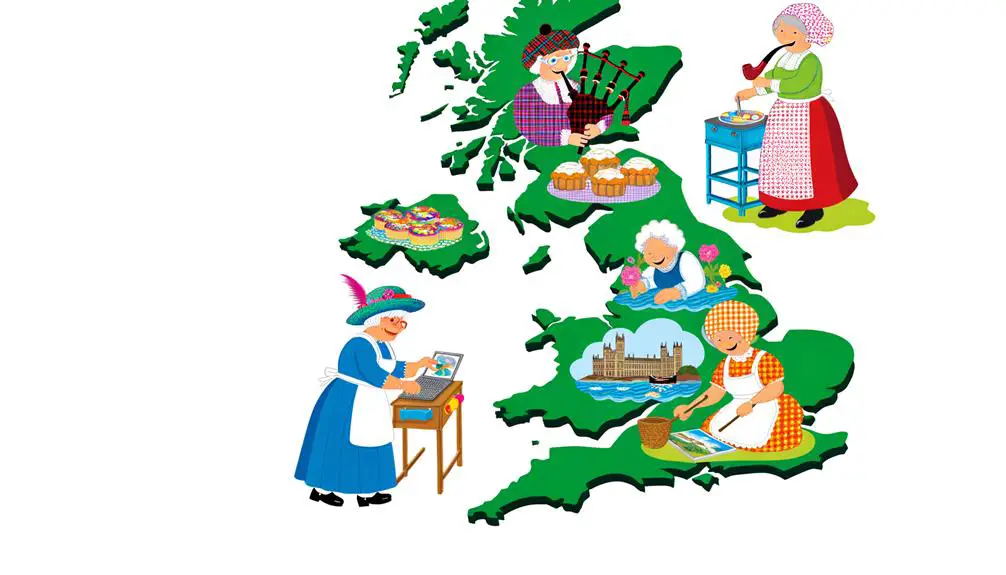
You'll find that the term 'Nan' embodies diverse nuances across the UK, shaped profoundly by regional dialects.
A look into the Urban Dictionary reveals a spectrum of interpretations and uses, highlighting the term's adaptability and cultural permeation.
This linguistic evolution underscores the dynamic nature of slang, reflecting changes in societal attitudes and generational shifts.
Regional Dialects and Nan
Understanding the term 'nan' requires delving into the rich tapestry of regional dialects across the UK, where variations highlight not just linguistic differences but also cultural nuances. The nan pronunciation itself shifts subtly from the north to the south, reflecting the diverse accents and dialects that pepper the British Isles.
These variations aren't merely phonetic but are deeply entwined with family connections, signaling a familiarity and endearment that transcends mere vocabulary. In analyzing these regional distinctions, one observes that 'nan' does more than designate a grandmother; it evokes a specific relational context and emotional resonance unique to each area.
This linguistic phenomenon underscores the complexity of British slang, where a single term can hold a multitude of meanings, shaped by the intricate interplay of regional identity and familial bonds.
Nan in Urban Dictionary
Diving into Urban Dictionary reveals a kaleidoscope of meanings for 'nan' across the UK, each variant reflecting the unique cultural and linguistic landscape from which it emerges.
This nan interpretation spectrum illustrates the dynamic nature of slang evolution within diverse communities. Urban Dictionary, as a user-generated content platform, showcases how 'nan' morphs from its conventional role denoting a grandmother, to embodying various other nuances depending on geographical and social contexts.
This platform acts as a living archive, capturing the fluidity and spontaneity inherent in slang usage. The entries for 'nan' not only catalog its current meanings but also hint at the underlying processes of regional adaptation and innovation, offering a rich tapestry of linguistic diversity.
Linguistic Evolution of Nan
Exploring the linguistic evolution of 'nan' reveals a rich tapestry of regional variations across the UK, each iteration reflecting the nuanced cultural and social influences of its area. Delving into 'nan etymology,' you uncover how its meaning and use have transformed, offering fascinating insights into linguistic shifts.
Academic studies emphasize:
- Dialectal Differences: Highlighting how 'nan' adopts distinct pronunciations and connotations, revealing regional identities.
- Historical Context: Tracing the term's origin and how historical events influenced its adoption and adaptation.
- Socio-Cultural Impact: Examining the role of 'nan' in expressing familial relationships and societal values.
These elements underscore the dynamic nature of language, illustrating how 'nan' serves as a mirror to the evolving landscape of British society.
'Nan' in Media and Literature
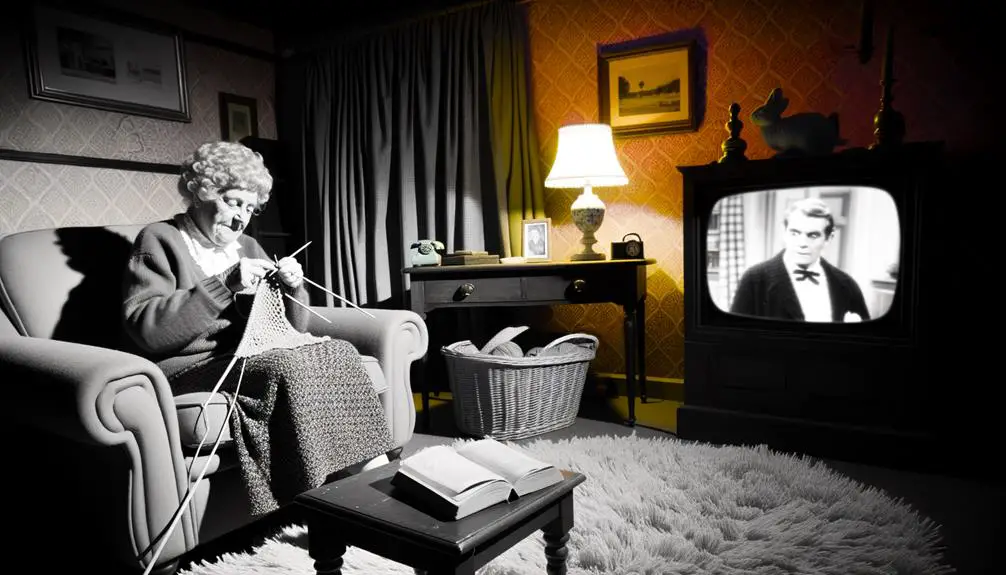
Numerous works of media and literature have employed the term 'nan' to encapsulate the quintessential British grandmother, reflecting its deep-seated cultural significance and nuanced connotations. These depictions, ranging from the stern yet loving matriarch to the cheeky and spirited old lady, enrich our understanding of the role 'nan' plays within the British cultural lexicon. Through nan adaptations in television, film, and books, the multidimensionality of this figure is explored, offering insights into familial dynamics, societal expectations, and the individuality of older women.
In literary nan portrayals, authors explore the intricacies of this relationship, weaving narratives that highlight the influence of grandmothers in shaping identities and imparting wisdom. These characters often serve as anchors in tumultuous times, embodying a blend of tradition and modernity that challenges stereotypical notions of aging. Their stories, while diverse, share a common thread: the profound impact of the nan on the lives of those around her.
Analyzing these adaptations reveals a cultural reverence for the grandmother figure, one that transcends mere familial bonds to touch upon themes of heritage, resilience, and love. The literary and media landscapes become arenas for celebrating the depth and diversity of the nan experience, offering nuanced portrayals that resonate with audiences far beyond their intended demographic.
Learning to Use 'Nan' Correctly
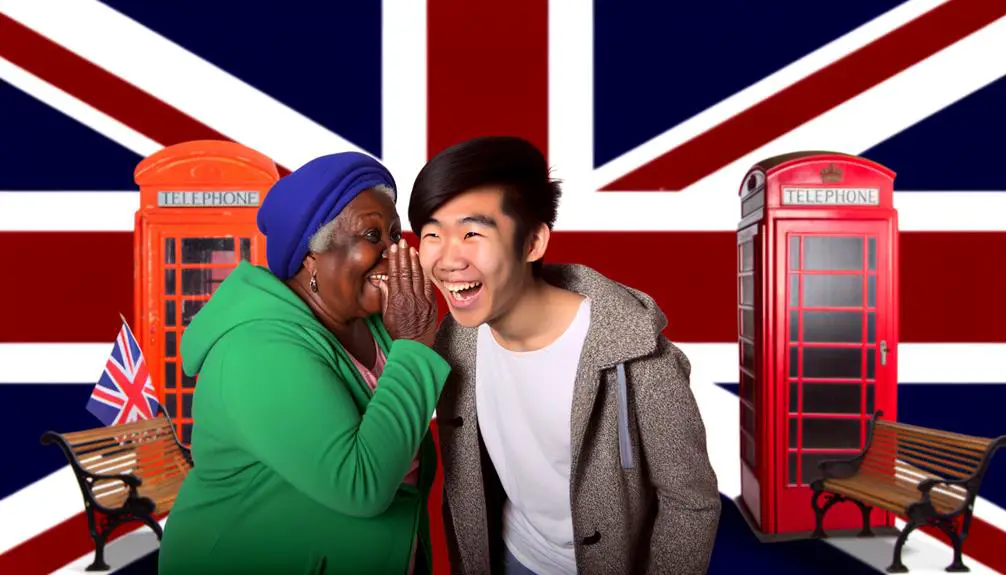
To use 'nan' correctly in conversation, it's important to understand its cultural nuances and the contexts in which it's appropriately employed. The term 'nan', deeply ingrained in British culture, carries with it a layer of familiarity and endearment not immediately evident to those unfamiliar with its usage. Mastering the use of 'nan' involves more than just knowing its meaning; it requires an appreciation of Nan etiquette and an adherence to certain pronunciation guidelines.
Here are three critical aspects to contemplate:
- Contextual Appropriateness: Nan is mainly used in informal settings, often among family and close friends. It signifies a level of intimacy and fondness. Utilizing 'nan' in a formal or professional context can be perceived as overly familiar or disrespectful.
- Pronunciation Tips: For non-natives, pronouncing 'nan' might seem straightforward, yet the subtleties in intonation can convey different degrees of affection or familiarity. The vowel sound should be short, akin to the 'a' in 'cat'. Emphasis and elongation can alter its perceived meaning or the warmth behind the utterance.
- Understanding the Cultural Significance: Beyond the dictionary definition, 'nan' evokes a sense of warmth, nostalgia, and familial bond within British culture. It's not merely a term; it's an embodiment of affectionate respect for one's grandmother or, by extension, an elderly woman to whom one is close. Ignoring this cultural layer can lead to misuse or misunderstanding.
Frequently Asked Questions
How Does the Use of 'Nan' in British Slang Differ When Used Among Different Age Groups, Particularly Between Teenagers and Older Adults?
When you examine how 'nan' is used across different age groups, you'll notice a fascinating shift. Among teenagers, it's often a casual term, lacking the formality that older adults might use when referring to their grandparents.
This generational perception highlights a broader trend in grandparent nicknames, where younger people opt for more familiar, affectionate terms.
It's a reflection of changing family dynamics and how respect is shown across generations.
Are There Any Notable Misinterpretations or Humorous Misunderstandings Involving the Slang 'Nan' Between British English Speakers and Non-Native English Speakers?
You've hit the nail on the head when exploring cultural nuances and language evolution through the slang 'nan.'
It's fascinating how misinterpretations, especially among non-native English speakers, highlight the playful yet complex nature of language. Differences in understanding can lead to humorous situations, underscoring the importance of context in communication.
This exploration offers a detailed look at how language evolves and adapts, bridging gaps while sometimes creating amusing misunderstandings.
Has the Term 'Nan' in British Slang Influenced or Been Adopted by Other English-Speaking Countries, and if So, How Is It Perceived or Used Differently?
You've noticed that 'nan' has crossed borders, showcasing interesting international adaptations. This term, rooted in British slang, has woven itself into the fabric of other English-speaking nations, albeit with nuanced differences.
Cultural perceptions shape its usage and interpretation, reflecting a blend of humor, endearment, and sometimes confusion. As it integrates into diverse linguistic landscapes, 'nan' illustrates the fluidity of language and the interconnectedness of our global community.
In What Ways Has Digital Communication and Social Media Impacted the Usage and Spread of 'Nan' in Contemporary British Slang?
Digital waves have transformed 'nan' from a simple word into an online lexicon symbol, reshaping its etymology.
In this digital age, 'nan' has proliferated through online abbreviations, becoming a staple in internet vernacular. Its usage mirrors the rapid evolution of language, showcasing how digital platforms amplify slang's reach and adaptability.
Analyzing this phenomenon reveals the intricate dance between traditional linguistics and modern communication, marking a significant shift in contemporary British slang.
Are There Any Regional Dialects Within the UK Where the Term 'Nan' Is Not Recognized or Used Differently, and What Are the Local Equivalents or Variations if Any?
You're exploring if regional dialects within the UK differ in recognizing or using 'nan.' The term's etymology and cultural significance vary across regions.
While 'nan' is widely understood, local equivalents or variations exist, reflecting the rich tapestry of British linguistic diversity. For instance, some areas might favor 'nanna' or 'gran.'
These variations underscore the word's adaptability and the role of regional identity in shaping language use.
Conclusion
Exploring the linguistic tapestry of 'Nan' reveals its roots deeply embedded in the rich soil of British heritage. As you've strolled through its evolution across the UK, it's clear that 'Nan' isn't merely a term; it's a cultural beacon, illuminating the nuances of familial affection within the British lexicon.
Whether whispered in hallowed halls or echoed in bustling streets, 'Nan' stands as a proof of the enduring legacy of language in knitting the fabric of society. Therefore, mastering its use is akin to weaving oneself into the very heart of British culture.







